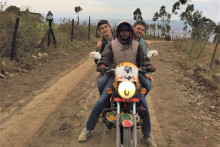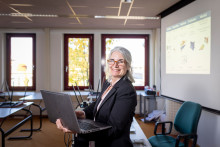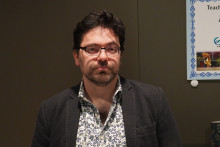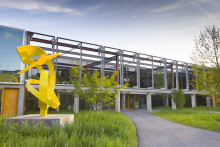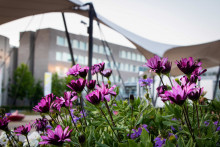Run by a group of friends, Briney’s has the goal of ‘providing safe drinking water to everyone in need’. The idea came to mind when two of the initiative’s founders visited Kenya in 2017. ‘That is when we first saw how water scarcity impacts families,’ say Stefan Brouwer and Kas van 't Loo, ITC student of Spatial Engineering. The core team of Briney’s includes two other UT students, Jasper van Asselt (Sustainable Energy Technology) and Ivan Ivanov (Spatial Engineering).
You aim to tackle water scarcity by making freshwater out of seawater. How exactly do you plan to achieve this?
Van Asselt: ‘We plan to use reverse osmosis to produce freshwater. We made a prototype for a new type of process last summer, but ultimately we decided to work with existing technology. The remaining salt will be sold in developed countries, such as the Netherlands. We are connecting producing freshwater and selling salt.’
Van 't Loo: ‘It sounds simple, but it is indeed not that simple. We are not the first ones to have thought of this. It is not a new technology. There are reverse osmosis plants built all over the world. For us, the technology is not the innovation. The difference is that we plan to sell the salt, which makes the process more sustainable. Another difference is that we want to collaborate with locals as much as possible. We’d like the individual sites to be run by locals and create even bigger social impact.’

Kasper van t'Loo in Kenya.
Haven’t there been other similar projects?
Brouwer: ‘There are indeed many projects focused on water scarcity. Some work well, some don’t. We have done some research and see that 30-50% of the projects fail within five years. Mainly because water systems are not designed to meet the need of the users and because 99% of the water projects are poorly monitored. People have all the right intentions, they do a project, it works but then they leave. We believe the commercial connection will make a difference.’
How far along are you with this idea? What are the next steps?
Van 't Loo: ‘We are focusing on building a reverse osmosis plant in Kenya, because we already have experience and connections there. We are now doing research into what would be the best place for construction. If the COVID-19 pandemic allows, we are planning to go to Kenya in the summer. We want to make sure we have a good understanding of the problem at the specific location, because the situation is different everywhere.’
Brouwer: ‘The next step is to develop the commercial part. We are still deciding which salt product to focus on. After that we need to develop a good business case, talk to investors and develop a good network with companies experienced in the field.’
Van t’ Loo: ‘We are still growing our team and network. Water scarcity is too big of a problem to be tackled by a few people. We need everyone.’
Stefan Brouwer (on the right) in Kenya in 2017.
It sounds like a large project to take on as students and young graduates. What drives you to do this?
Van t’ Loo: ‘When I was in Kenya, I was having dinner with a Maasai family. They explained that they had to keep moving to make sure they had water for them and their baby. I could not understand why this problem still existed. We are able to explore outer space, but there is not enough water for everyone. When I started studying at ITC, it opened my eyes. Finally, I could think of not only the problem, but also possible solutions. I realized that there were things we could do. I still have the picture of the family on my desk as a reminder why we do this.’
Van Asselt: ‘What really drives me is contributing to a world problem that keeps growing. I study Sustainable Energy Technology and I want to accelerate the transition to a more sustainable world.’
Brouwer: ‘I came to the conclusion that the most valuable thing in life is time. You can’t buy it and you never know how much you have. So you need to think about how you spend your time. This is an amazing adventure where I can really contribute. That is something that makes me really happy.’


